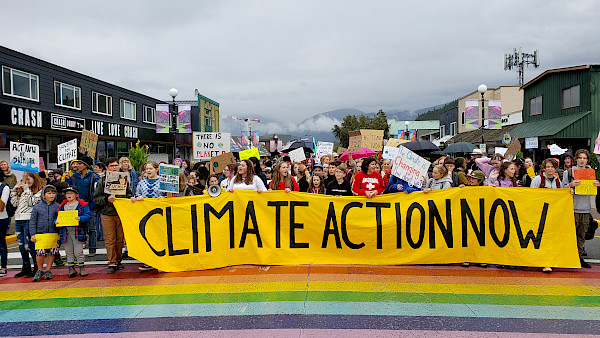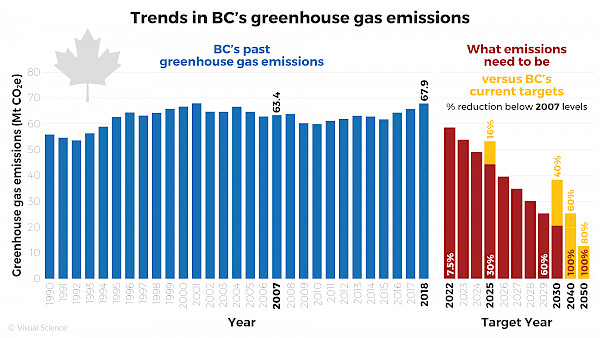Epic fail: CleanBC’s roadmap to 2030 is a highway to hell
BC’s climate plan falls far short of the bold and transformative changes that are required to keep warming to 1.5 degrees Celsius.
Unceded xʷməθkʷəy̓əm, Sḵwx̱wú7mesh and səlilwətaɬ territories (VANCOUVER, BC) — CleanBC has released its Roadmap to 2030 in the leadup to COP26, yet this latest climate plan will not limit warming to 1.5°C, and will not keep British Columbians safe from the worst impacts of climate change.
“This is an epic fail. CleanBC’s roadmap to 2030 is a highway to hell,” said Tracey Saxby, marine scientist and Executive Director of My Sea to Sky. “You cannot have a credible climate action plan without a plan to phase out fossil fuel extraction.”
After a summer of heatwaves, wildfires, drought, floods, crop failure, fisheries collapse, and infrastructure damage, it is clear that climate change is intensifying, and Canada is warming at nearly twice the global rate. Scientists are warning that if we fail to take transformative climate action we are on the brink of climate, ecological, & social collapse.
“This summer’s heatwave was the deadliest climate-related event in Canada’s history, and an entire town burned to the ground. Yet BC is still not treating the climate emergency as an emergency,” Saxby said.
“The BC government’s continued commitment to fracking and LNG exports means everyday people will have to do even more to reduce emissions while the oil and gas industry continues to pollute. How is that fair?”
My Sea to Sky is one of more than 240 diverse organizations and businesses that have signed an open letter calling on the BC government to confront the climate emergency and undertake ten urgent climate actions. We reiterate our support for these actions, and call on the BC government to commit to transformative climate action.
“This is a step in the right direction, but fails to achieve the visionary leadership required because it fails to phase out fossil fuel extraction. The next ten years are critical to ensure the future of life on Earth.”
What we like
- Factoring climate change into all government decision-making.
- Support for climate action driven by local governments.
- Financial support for low-income and middle-income families to incentivize climate action and ensure no one is left behind.
- Progress on emissions reduction for transportation, buildings, communities, and regenerative agriculture.
- Increased price on carbon pollution.
- Focus on industrial methane pollution.
- Commitment to electrification.
Red flags
- 40% emissions reduction target is not aligned with IPCC recommendations for Canada to reduce emissions 60% below 2010 levels by 2030.
- No planned phase-out for fossil fuel extraction including fracking and liquefied natural gas exports.
- Investment in false solutions like blue hydrogen generated by fracked gas that will lock in climate pollution for decades.
- Reliance on unproven carbon capture, utility and storage, which has an 80% failure rate.
- More subsidies for oil and gas companies, which incentivizes continued extraction instead of switching to renewable energy.
- Proposal to grow carbon sinks, while BC is actively logging old growth.
- Inclusion of fossil fuel executives in the Climate Solutions Council, and the need for consensus has undermined BC’s climate action plan.
- The oil and gas sector comprises 23% of total emissions, yet will only account for emission reductions of 16%.
- LNG as a fuel for marine shipping is a false solution.
- No plan to phase out natural gas utilities.
Why this doesn’t measure up
- To limit temperature rise to 1.5° Celsius (C), British Columbia needs to immediately decrease fossil fuel production and consumption by roughly 7.5% every year between now and 2030. [SEE GRAPH]
- The latest report from the Intergovernmental Panel on Climate Change is a ‘code red’ for humanity. The report found that the production of oil, coal, and gas is the primary cause of the climate crisis, with fossil fuels responsible for 85% of CO2-equivalent emissions in the last decade. BC needs to commit to rapidly phase-out all fossil fuel extraction and use, and switch to renewable energy.
- The International Energy Agency has called on world governments to immediately stop investments in and approvals of new oil and gas projects. Continued fracking and liquefied natural gas exports undermine BC’s climate action commitments.

